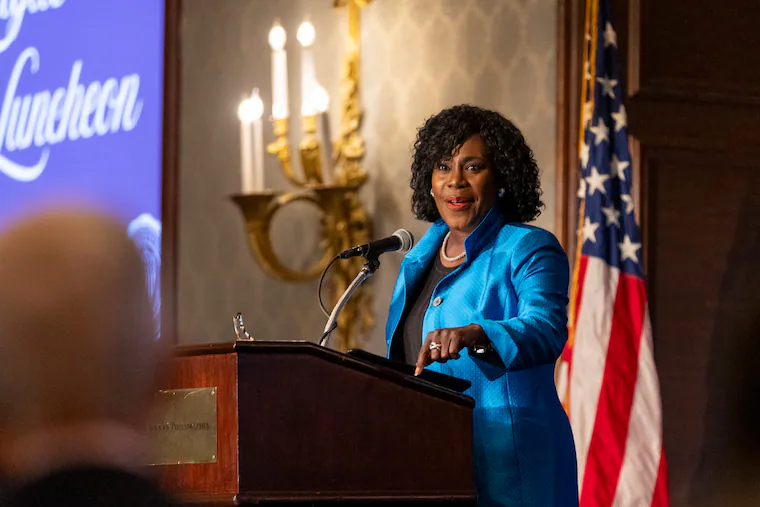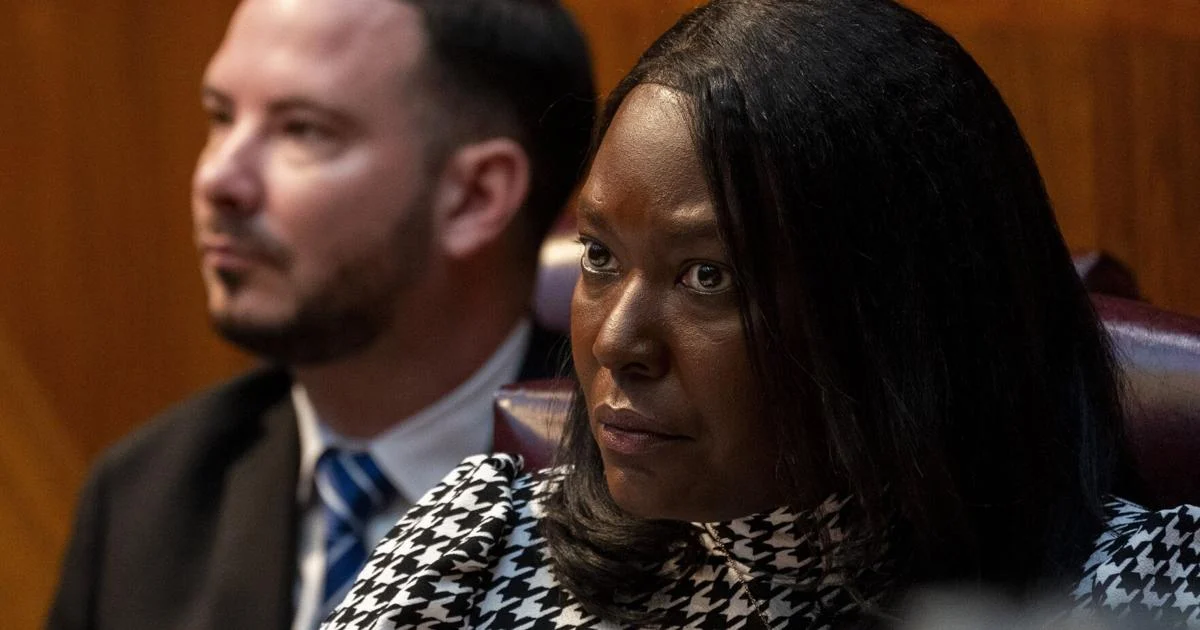
Mayor Cherelle L. Parker on Thursday touted Philadelphia’s successes during her 21-month tenure and defended her administration’s approach to slowly cutting business taxes during a “State of Philadelphia” speech at the Union League, the conservative private membership club on South Broad Street.
“I wholeheartedly believe that the state of Philadelphia under the Parker administration is strong,” Parker, a Democrat, said during a one-hour address at the club, which was originally formed to raise money for the Union during the Civil War.
Parker had plenty of wins to point to since she took office in January 2024. Philadelphia’s poverty rate has fallen below 20% for the first time since 1979. Homicides have plummeted and are on pace for their lowest annual total in a half-century. And the city’s population ticked up in the latest Census estimate, following a temporary dip amid the convulsions of the coronavirus pandemic.
Those measures of the city’s progress had largely been heading in the right direction before Parker took office, and they correlate to national trends. The mayor said her administration would do the work necessary to keep them going.
“There’s no rest for my team,” Parker said. “There’s no exhaling at 20 months and 18 days, saying, ‘Yay, mission accomplished.’ Why? Because we have far too much work to do.”
Despite being a Democrat speaking at a major stop on the national GOP fundraising circuit, Parker likely had many genuine allies in the crowd. Her moderate politics and tough-on-crime approach to public safety helped her defeat more progressive rivals in the 2023 mayoral election, and she frequently touts her record of working with Republicans when she was a state legislator.
“We are completely unwavering and supportive of Mayor Parker and her clear and enthusiastic vision that she has for our city,” Robert M. Cavalier, an attorney and the president of the Union League, said at the luncheon.
As usual, Parker made no mention of the person who poses the greatest threat of derailing her agenda: President Donald Trump, who gave a foreign policy speech at the Union League during his 2016 campaign.
Trump’s administration has included Philadelphia in a list of sanctuary cities, or jurisdictions that decline to assist federal immigration enforcement, that it is targeting for funding cuts or other punishments. But it has not yet followed through on those threats, and Trump has not mentioned Philadelphia as one of the cities where he is considering deploying National Guard troops.
» READ MORE: Mayor Cherelle Parker won’t say how Philly is responding to President Donald Trump’s demands on ‘sanctuary’ policies
Parker on Thursday noted that the city used more than $2 billion in federal funds in 2024. But unlike many other state and local Democrats, Parker has avoided directly attacking Trump since he began his second term in January.
And so far, Trump has largely left Philadelphia alone.
From tax cuts to city worker wages
Parker made a point of explaining one of her decisions that may not have gone over well with some in the well-heeled crowd: her handling of the the business income and receipts tax, or BIRT.
Business leaders have for several years been pushing for dramatic and rapid reductions in the levy, which now taxes 5.71% of companies’ profits as well as 0.141% of their gross receipts, or total revenue from business in the city.
Instead, Parker and City Council President Kenyatta Johnson worked together to push through Council a plan to make small annual reductions over 13 years. If future mayors and Councils do not amend the law, it will eventually eliminate the gross receipts portion of BIRT and reduce the net income portion to 2.8%.
» READ MORE: What small business owners need to know about the major changes coming to Philly’s tax code
But most of the steep cuts would take place after Parker leaves office, assuming she serves two consecutive terms.
“While we knew we needed to be both pro-growth and fiscally responsible, we also knew that everybody wouldn’t be happy,” she said. “So the business community will say, ‘Those tax investments were approved by City Council and signed into law … but it wasn’t enough.’ But we did the best we could with what we had.”
She tied her cautious approach to business tax cuts to the firm line she took in contract negotiations with the largest union for city workers, District Council 33 of the American Federation of State, County and Municipal Employees.
DC 33 went on strike in July, shutting down residential trash collection and hindering other city services for eight days in a bid to win raises of 5% per year.
“If you would have told me, when I put my hand on that Bible, that we would have had to weather an eight-day sanitation worker strike, and it was the first such work stoppage in Philadelphia in over four decades, I would have said, ‘Jesus, what are you doing to me?’” she said.
» READ MORE: ‘They are my people’: Mayor Cherelle Parker on why she stood firm in the DC 33 city worker strike
Parker refused to budge, and the union eventually agreed to a contract with 3% annual raises.
“We had to balance the best interest of our taxpayers, the best interest of our workforce, and the best interest of our business community,” she said. “And I don’t know about you, but I think we did a pretty good damn job.”
States of the city
Parker is known as a strong — if long-winded — orator, and she has delivered numerous high-profile speeches as mayor.
Previously, the mayor’s budget address to City Council in March served as Philadelphia’s version of the presidential “State of the Union.” Parker has delivered two of those, plus an unusual separate address to Council to unveil her housing plan. She also spoke at the Chamber of Commerce for Greater Philadelphia’s annual luncheon, a mayoral tradition.
Last year, she added a “State of the City” address to the calendar, delivering the speech at Temple University in December. Parker spokesperson Joe Grace said Thursday’s speech was an “update” to that address. She will still deliver a second “State of the City” in December.
Thursday’s speech, which was part of the Union League Presidential Luncheon Series, put a spotlight on Greg Segall, a Union League member and chairman and CEO of the investment firm Versa Capital. A lifelong Republican, Segall met Parker when she was preparing to launch her mayoral campaign and became an important early backer.
“I’ve been asked many times how I came to engage in Philadelphia Democratic mayoral politics,” Segall said while introducing Parker at the luncheon. He said he was impressed by her ability to work with stakeholders across the political spectrum and believed in her plan to turn around the city following the pandemic and simultaneous gun violence crisis.
“The 2023 election took place at a time of crisis in the city, and getting the right leader was never more critical,” Segall said. “So the reason for my commitment to her was quite simple: Before I’m a Republican, I’m a Philadelphian.”
Segall gave $150,000 to an outside spending group that backed Parker’s 2023 run, in addition to donating several thousand directly to her campaign.
After she won, Parker tapped Segall to be co-chair of her transition committee and has since appointed him to the Tax Reform Commission and the Philadelphia Gas Works board. He is also co-chair of the Mayor’s Business Roundtables, a Parker initiative.
Parker said she would be calling on other corporate leaders to help the city, especially as it prepares for the high-profile events coming to Philadelphia in 2026, including FIFA World Games; the MLB All-Star Game; and the Semiquincentennial, the nation’s 250th anniversary.
“I don’t care if we’re talking about FIFA, if we’re talking about the Major League All-Star Game — every celebration that is coming here, we are going to need a corporate council that will help us generate the revenue that we need, and, quite frankly, help bring some of the technical expertise that we need,” she said.



